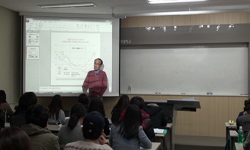2016-2017 witnessed the Candlelight Revolution, a series of protests in which 16 million South Koreans peacefully and successfully demanded the end of Park Geun-hye’s presidency. This paper probes what this event says about the strength of South Kor...
http://chineseinput.net/에서 pinyin(병음)방식으로 중국어를 변환할 수 있습니다.
변환된 중국어를 복사하여 사용하시면 됩니다.
- 中文 을 입력하시려면 zhongwen을 입력하시고 space를누르시면됩니다.
- 北京 을 입력하시려면 beijing을 입력하시고 space를 누르시면 됩니다.

Korea’s Candlelight Protests in Context: Evidence from the Asian Barometer Survey and Global Events Data
한글로보기https://www.riss.kr/link?id=A106183020
-
저자
José Alemán (Fordham University)
- 발행기관
- 학술지명
- 권호사항
-
발행연도
2019
-
작성언어
English
- 주제어
-
등재정보
KCI등재
-
자료형태
학술저널
-
수록면
313-352(40쪽)
-
KCI 피인용횟수
1
- DOI식별코드
- 제공처
-
0
상세조회 -
0
다운로드
부가정보
다국어 초록 (Multilingual Abstract)
2016-2017 witnessed the Candlelight Revolution, a series of protests in which 16 million South Koreans peacefully and successfully demanded the end of Park Geun-hye’s presidency. This paper probes what this event says about the strength of South Korea’s democracy. Scholars have argued that popular mobilization is positively associated with commitment to and support for democracy in East Asia. Using survey and events data, I study the factors driving protest participation in Korea and compare the Candlelight Revolution to previous protest cycles there. I also compare protest and repression in South Korea to domestic conflict in other Third Wave democracies. My research yields two important findings: political protest has become both more routine and less violent in South Korea, and genuine concerns about the quality of democracy rather than dissatisfaction with the political system have driven citizens to partake in protests in recent years. These findings imply that the Candlelight Revolution, the most recent manifestation of popular contention in Korea, reflects and is concerned with the quality of the country’s democracy.
참고문헌 (Reference)
1 Bizzarro, Fernando, "The V-Dem Party Institutionalization Index: A New Global Indicator (1900-2015)" V-Dem 2017
2 Lee, Sangwon, "The Role of Social Media in Protest Participation: The Case of Candlelight Vigils in South Korea" 12 : 1523-1540, 2018
3 Schrodt, Philip A., "The Isreali Conflict System: Analytic Approaches" Routledge 9-31, 2016
4 Dalton, Russell, "The Individual-Institutional Nexus of Protest Behaviour" 40 (40): 51-73, 2010
5 Boulding, Carew E., "Protest and Democracy" University of Calgary Press
6 정재관, "Popular Mobilization and Democratization: A Comparative Study of South Korea and Taiwan" 한국학술연구원 42 (42): 377-411, 2011
7 Steinert-Threlkeld, Zachary C., "Online Social Networks and Offline Protest" 4 (4): 1-9, 2015
8 Kostelka, Filip, "It’s Not the Left: Ideology and Protest Participation in Old and New Democracies" 2019
9 Norris, Pippa, "Electoral Integrity in East Asia" 12 (12): 1-24, 2016
10 Klein, Graig R., "Dynamics of Political Protests" 72 (72): 485-521, 2018
1 Bizzarro, Fernando, "The V-Dem Party Institutionalization Index: A New Global Indicator (1900-2015)" V-Dem 2017
2 Lee, Sangwon, "The Role of Social Media in Protest Participation: The Case of Candlelight Vigils in South Korea" 12 : 1523-1540, 2018
3 Schrodt, Philip A., "The Isreali Conflict System: Analytic Approaches" Routledge 9-31, 2016
4 Dalton, Russell, "The Individual-Institutional Nexus of Protest Behaviour" 40 (40): 51-73, 2010
5 Boulding, Carew E., "Protest and Democracy" University of Calgary Press
6 정재관, "Popular Mobilization and Democratization: A Comparative Study of South Korea and Taiwan" 한국학술연구원 42 (42): 377-411, 2011
7 Steinert-Threlkeld, Zachary C., "Online Social Networks and Offline Protest" 4 (4): 1-9, 2015
8 Kostelka, Filip, "It’s Not the Left: Ideology and Protest Participation in Old and New Democracies" 2019
9 Norris, Pippa, "Electoral Integrity in East Asia" 12 (12): 1-24, 2016
10 Klein, Graig R., "Dynamics of Political Protests" 72 (72): 485-521, 2018
11 Norris, Pippa, "Do Perceptions of Electoral Malpractice Undermine Democratic Satisfaction? The US in Comparative Perspective" 40 (40): 5-22, 2019
12 이윤경, "Digital Opportunities and Democratic Participation in Tech-Savvy Korea" 한국학술연구원 44 (44): 545-568, 2013
13 Kim, Sun-Chul, "Democratization and Social Movements in South Korea: Defiant Institutionalization" Routledge 2016
14 Gunitsky, Seva, "Democratic Waves in Historical Perspective" 16 (16): 634-651, 2018
15 Paul Y. Chang, "Candlelight Protests in South Korea:The Legacies of Authoritarianism and Democratization" 이화사회과학원 34 (34): 5-18, 2018
16 Lee, Cheol Sung, "Associational Networks and Welfare States in Argentina, Brazil, South Korea, and Taiwan" 64 (64): 507-554, 2012
17 Katsiaficas, George, "Asia’s Unknown Uprisings. Volume 1: South Korean Social Movements in the 20th Century" PM Press 2012
동일학술지(권/호) 다른 논문
-
국제금융질서의 변화와 금융위기에 대한 해석: 금융시장의 불안정성에 대한 세 가지 관점
- 고려대학교 평화와 민주주의연구소
- 정재환
- 2019
- KCI등재
-
- 고려대학교 평화와 민주주의연구소
- 김성은
- 2019
- KCI등재
-
소득기반 투표의 비활성화 원인: 제 7회 전국동시지방선거 분석
- 고려대학교 평화와 민주주의연구소
- 문우진
- 2019
- KCI등재
-
- 고려대학교 평화와 민주주의연구소
- 최현진
- 2019
- KCI등재
분석정보
인용정보 인용지수 설명보기
학술지 이력
| 연월일 | 이력구분 | 이력상세 | 등재구분 |
|---|---|---|---|
| 2027 | 평가예정 | 재인증평가 신청대상 (재인증) | |
| 2021-01-01 | 평가 | 등재학술지 유지 (재인증) |  |
| 2019-01-01 | 평가 | 등재학술지 유지 (계속평가) |  |
| 2016-01-01 | 평가 | 등재학술지 유지 (계속평가) |  |
| 2014-01-14 | 학술지명변경 | 외국어명 : 미등록 -> Peace Studies |  |
| 2012-01-01 | 평가 | 등재학술지 유지 (등재유지) |  |
| 2010-05-28 | 학회명변경 | 한글명 : 평화연구소 -> 평화와 민주주의연구소영문명 : Institute for Peace Studies, Korea University -> Peace & Democracy Institute |  |
| 2009-01-01 | 평가 | 등재학술지 선정 (등재후보2차) |  |
| 2008-01-01 | 평가 | 등재후보 1차 PASS (등재후보1차) |  |
| 2006-01-01 | 평가 | 등재후보학술지 선정 (신규평가) |  |
학술지 인용정보
| 기준연도 | WOS-KCI 통합IF(2년) | KCIF(2년) | KCIF(3년) |
|---|---|---|---|
| 2016 | 0.82 | 0.82 | 0.72 |
| KCIF(4년) | KCIF(5년) | 중심성지수(3년) | 즉시성지수 |
| 0.69 | 0.74 | 1.224 | 0.27 |




 DBpia
DBpia


